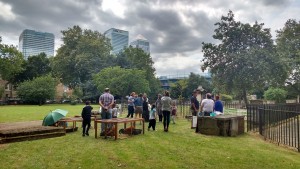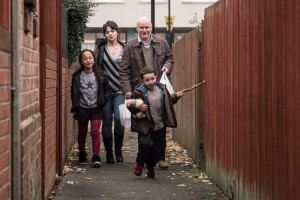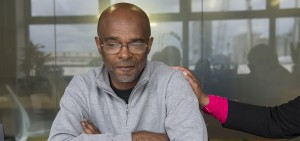The Joseph Rowntree Foundation recently published a new report looking at how “decisions and behaviours play a vital role in helping avoid and escape poverty”. Their findings showed that poverty and low socio economic status does have an influence on the process underpinning decision making.
We define crisis as having no money and no food. We know crisis has a huge effect on someone’s ability to think clearly and rationally. When you are stressed and hungry, life becomes all about survival and making it through the day, so naturally decisions that will benefit in the short term are made. The findings in this report outline examples and reasons to why this might be the case. For us, the report reinforces how important our holistic approach is for people in poverty, to help them discover and resolve the root cause of the crisis through specialist welfare advice and relational support, as well as giving short term help in means of emergency food support.
There are three findings in the report that we could particularly relate to having come across situations in our work:
- “People living in poverty make decisions focused on coping with present stressful circumstances, often at the expense of future goals.”

We run our LOVE Summer holiday scheme for families who struggle when their children aren’t receiving free school meals because of the extra expense it causes. Our scheme is an opportunity for families to receive weekly support, a chance to build relationships and have fun together. Families also meet with our Project Worker for additional support and have access to a benefits health check in case they are not in receipt of all the financial support they are entitled to. These families are in survival mode; trying to make it to the end of each month without unexpected expenses or situations arising, for example replacing a child’s lost school blazer becomes a financial worry. Long term goals or dreams seem unreachable. However, we put more than food in bellies, we put hope in hearts. Anybody can achieve anything with the right opportunities and support.
- “For many individuals living in poverty, the choices made are not always bad ones, but are adapted to the constraints of life with very few resources”
 Sometimes the options are very limited. For example, when a person fails the Work Capability Assessment (WCA) and they want to challenge the decision but in meantime they will receive no income; they apply for Job Seekers Allowance (JSA) not because they are fit for work but because they need money to pay living costs and bills. This is just one example of when choices have had to be made in order to adapt to a life with very few resources. This particular situation is recently highlighted in Ken Loach’s ‘I, Daniel Blake’ film. If you feel passionate about social justice and the welfare system, we would recommend that you watch this film. Here is a link to the trailer.
Sometimes the options are very limited. For example, when a person fails the Work Capability Assessment (WCA) and they want to challenge the decision but in meantime they will receive no income; they apply for Job Seekers Allowance (JSA) not because they are fit for work but because they need money to pay living costs and bills. This is just one example of when choices have had to be made in order to adapt to a life with very few resources. This particular situation is recently highlighted in Ken Loach’s ‘I, Daniel Blake’ film. If you feel passionate about social justice and the welfare system, we would recommend that you watch this film. Here is a link to the trailer.
- “People with lower socio-economic status have a significantly lower sense of self-worth, which can dampen their motivation to improve their condition.”
 This finding was evident when our First Love Foundation hero, Alfred was referred to us. He was so stressed and low in spirits that he had to bring a friend with him to speak on his behalf. His income had been drastically reduced following the introduction of the bedroom tax. He was left with £43 a week to cover all bills and expenses. “I was eating a sandwich, maybe once a day. You’ve got to make £10 last a week before you get paid again.” Although looking for work, Alfred was struggling and losing hope. “It’s no joke. When you don’t eat properly you starve. You lose your self-esteem and everything. I was sending out my CV 15 times a day to companies. Sometimes you get replies back and sometimes you don’t.” Fortunately, we were able to help Alfred get back on track with the right advice and support, which resulted in him getting a job and having a sustainable life. Read his full story here.
This finding was evident when our First Love Foundation hero, Alfred was referred to us. He was so stressed and low in spirits that he had to bring a friend with him to speak on his behalf. His income had been drastically reduced following the introduction of the bedroom tax. He was left with £43 a week to cover all bills and expenses. “I was eating a sandwich, maybe once a day. You’ve got to make £10 last a week before you get paid again.” Although looking for work, Alfred was struggling and losing hope. “It’s no joke. When you don’t eat properly you starve. You lose your self-esteem and everything. I was sending out my CV 15 times a day to companies. Sometimes you get replies back and sometimes you don’t.” Fortunately, we were able to help Alfred get back on track with the right advice and support, which resulted in him getting a job and having a sustainable life. Read his full story here.
The report concludes with, “people living in or near poverty experience a shift in psychological, social and cultural processes that may hinder their ability to make decisions that are beneficial in the long term”. People in poverty are forced to adapt to circumstances and do whatever is needed to survive, even if it could have potentially negative implications in the long term.
These decisions focus on four aspects:
- The present
- The actual
- Those socially close
- The ‘here’
The way we work, at First Love Foundation, is to tackle poverty and social justice in Tower Hamlets through a unique and holistic approach. We address the immediate need by providing emergency food support, but the heart of what we do is provide advice & support to tackle the root cause of their problems and underlying issues – to break the cycle of crisis. We guide and enable people to get themselves back on their feet so that they have a new hope and resilience for the future.
By donating today, you can support people referred to us to ensure the poverty cycle is broken and lives are transformed. Just £10 can start a journey out of crisis for someone.*
*£10 is the estimated cost of providing a one to one meeting with our Project Worker.
